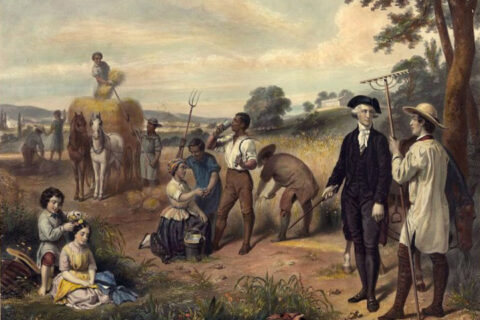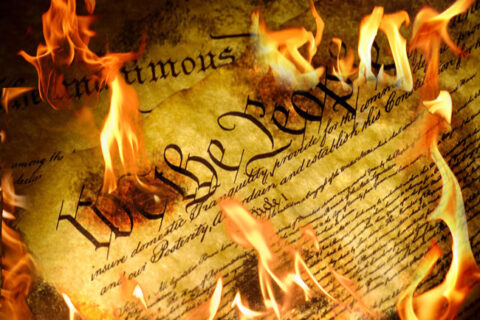Tennessee historically holds the reputation for being a moderate Southern state. This characteristic evidently upholds its reputation upon inspection of the state’s experiences during the War Between the States and Reconstruction. However, that caricature in some instances carries no weight, as was seen in the state’s contribution of troops to the Confederate cause. The developments which Tennessee undertook during Reconstruction, at times, refuted the idea of a fence sitting state. This essay will detail and analyze the events surrounding the economic, political, and social circumstances of Tennessee during Reconstruction.
Many Tennesseans already lived in poverty prior to the War. Appalachia’s history tells a dark tale of nomadic vagabonds, poverty, and malicious opposition to the Landed Gentry of the Lowland South. Within the Volunteer State, the condition of Appalachian poverty in the eastern third of the state remained relatively unhindered. They were poverty stricken at the outset of the War and remained so afterwards, albeit including the ravages of military invasion.
Many across the state returned home to destroyed houses and property as well as displaced, starving, or dead families. The amount of battles fought within the region was staggering and left much of the handful of populated areas in ruin. Memphis and Nashville had both been hotbeds of secessionist sentiment and influenced their respective regions by endorsing Anglo-influenced chattel slavery. Though those places had suffered, many of the most prominent of former aristocratic families still held mass swathes of land while the yeomen farmers, typically of Appalachian origin, held little. This characteristic would continue for several more generations and lead to intense fracturing of the Democratic Party and allow for significant Republican influence in the latter parts of the 19th century.
Politically, Tennessee’s experiences remained Radically dominated and uncomplicated for the entirety of Reconstruction. Ironically, this allowed it to shed its Radical regime a bit more quickly than other former Confederate constituents. Stated bluntly, it was the first state to be Redeemed following the implementation of Republican control.
The situation occurred specifically because of the election of the Radical East Tennessean William Gannaway Brownlow to the governorship in 1865. Handily winning the election due to the total disfranchisement of ex-Confederates, Brownlow ruled with a malicious fervor typical of the Radical caricature. Quickly ratifying the 13th Amendment and the 14th Amendment after its requirement by Congress, the Volunteer state became the first state readmitted to the Union and the only one in 1866. In addition to his immediate restrictions on former Confederates’ right to vote and excepting the already tyrannical Ironclad Oath, Brownlow stripped the right from former Confederates for five years and any Confederate leadership for 15, adding insult to injury. He later went so far as to require Whites to “prove” they had supported the Union in order to vote.
In 1867, Black males gained the rights of full suffrage and exercised those rights accordingly, at the behest of Brownlow who sought to continue the expansion of the GOP within the state. In response, violent racial activity spread throughout the state. Whether coincidental or not, the reports of malignant activity, regardless of veracity, also increased the more involved Blacks were within the political sphere and the more aggressive they became in the affairs of White men. In response to the “Kuklux disturbances,” which abruptly spiked in number following the full suffrage of Black males, Brownlow declared total martial law and dispatched state militias accordingly. The Tennessee State Guard came to being as a result of Brownlow’s crackdown of such civil unrest. He went as far as to declare total martial law in nine counties.
Hoping to replace David T. Patterson in the U.S. Senate, Brownlow resigned from the governorship near the end of his second term in 1869. While he would go on to continue his Radical impulses in Congress, particularly in regards to the Enforcement Acts, Dewitt Clinton Senter, the then Speaker of the Senate, assumed the vacant office. Initially appearing as an ardent Radical to appeal to his base, Senter quickly disbanded multiple militias, which had grown abusive and unpopular, and governed as a moderate. Having been thrust into an upcoming gubernatorial election due to Brownlow entering the Senate so late in his term, Senter quickly removed and replaced around 75% of the county election commissioners, many of whom held Confederate sympathies. This resulted in high White turnout which handily reelected Senter to a full term. Presiding over a new state constitutional convention in 1870, he allowed for the establishment of early forms of Jim Crow legislation in Tennessee. His policies effectively handed over power to the Democrats in the next election in 1871.
The most noteworthy aspect of Tennessee’s Reconstruction resides not in the economic or political circumstances but the social situations which unfolded. The aforementioned economic and political affairs as well as bitterness over the loss of the War penetrated deeply into the hearts of the population. Pouring salt on an open wound, fanatical, bigoted Radicals dominated the state and harassed the locals unceasingly, particularly via the militias which arose in response to the violence of the late 1860s.
One of the single most important moments in Southern, as well as American, history occurred early in the state’s Reconstruction. On Christmas Eve, 1865 in Pulaski, six former Confederate officers convened to establish a secret society for the purpose of allowing Confederate veterans the means of maintaining fraternity with one another. Primarily wishing to simply have fun utilizing bizarre rituals and harmless jokes, the Confederates knew little of what would become of the group which would soon escape their grasp and wildly terrorize rural areas across Dixie. The infamous Ku Klux Klan was born.
Without delving into the Klan’s history post-Reconstruction, the loose affiliation of local chapters established for itself a name which permanently entrenched into the American historiography long before its peak in the 1920s. Growing quickly after its founding, the initial chapters had convened to create a constitution of rituals and a fraternal hierarchy and had established Nathan Bedford Forrest as its first Grand Wizard by 1867. By 1867, the Radicals had forcibly passed the Reconstruction Acts against the will of President Andrew Johnson; however, Tennesseans already understood the oppression of Radical rule. Union Leagues also found widespread establishment across the suppressed former Confederacy in 1867 with the intent of organizing freedmen to vote. The Union Leagues quickly devolved into militant organizations through which freedmen would terrorize local communities if not given the opportunity to do so via militias.
These circumstances in 1867 caused mass expansion of “Kuklux organizations,” primarily within rural areas. By 1869, the moniker had become totally co-opted by violent individuals and criminals because it had been decentralized and difficult to control the nature of the organization. With Forrest renouncing the group and calling for its dissolution, the remaining members of quality character grew disgusted with the bestial tendencies of the belligerent infiltrators and left the Kuklux fraternity as well. Violence grew to the extreme to such an extent that politicians were killed, some states had whole counties placed under martial law, and a small-scale war even took place in North Carolina, called the Kirk-Holden War. Though not impacting Reconstruction in much of a significance overall, the birth of the Klan remains its primary affect of the era.
A pivotal location during the War Between the States, Tennesseans battled between its staunch Unionist sentiments and its Confederate loyalties during Reconstruction. An analysis of the economic, political, and social circumstance enhance this view. Unique among Southern states bearing Radical Reconstruction from the end of the War until its Redemption, Tennessee became the first state in the region to be Redeemed. Though its moderate position would endear well into the Jim Crow Era, the Volunteer State still participated firmly in the voting patterns of the soon to come Solid South. Suffering greatly during the War and Reconstruction, the influence Tennesseans had on Reconstruction appears lacking in comparison to most others; however, its quick rejection of Radicalism and production of the early Klan cements the state firmly in the annals of Southern Reconstruction.
“The White people of the South are the greatest minority in this nation. They deserve consideration and understanding instead of the persecution of twisted propaganda.” –Strom Thurmond






Really good article, thanks for writing it. I only wished there was some way for us to codify our history, from our standpoint into a curriculum that we can teach our children. Just teaching our people the history of Republican brutality and betrayals, not just then but all of the years since would have saved us so much anguish and confusion. Their betrayal of us in Mississippi with the flag for instance was so surprising to us, but now I know it absolutely should not have been, in large part thanks to the good men of this site, pat yourself on the back. To think of all the time me and my generation wasted just noticing something was wrong with them and then coining the term RINO, then wasting time being “Libertarians” and all of the rest could have been saved had I known my own history, it would have made since from the start and I would never have supported one. None of us would have, if only we had known. So much wasted time, making the same mistakes over and over. Thank you for all that you do for us, it really does matter, great job sir.
Michael,
Take a look at what the fine folks at Shotwell Publishing and the family behind the Christendom Curriculum are doing. You might be “pleasantly surprised.” My kids were/are *all* homeschooled; only one of them has ever set foot in a (Yankee) public school. The married ones with their own children are very high on Christendom Curriculum, as well as Shotwell Publishing. And so am I, for what it’s worth. Check them out.
What does the term “Anglo-influenced chattel slavery” mean? Where did the term come from?
Yeah, that confused me as well. I was just commenting on another site about how we have to stop using our enemies terminology and develop our own, every time we use a term that they coined we buy into their narrative and then begin to propagate it for them, its win every time we use one of their terms for anything and we must stop doing it. In addition we must begin developing our own terminology to replace what we have been using that was written by our enemies, “The Civil Rights Movement” or even “Reconstruction” for example, those terms do nothing to convey the brutality or oppressive evil purpose behind those actions and we should stop using them.
In the instance I was talking about earlier, on the other site, it was about how even Tommy Robertson calls the Muslims that his marxist government are flooding his country with “Migrants”. Calling them that is a win for them, just using the word is a loss for him every time he does it. Terminology is fundamental to framing and context, but it seems like all of ours is written by our enemies and I cannot for the life of me understand why we accept that and do not develop our own, whats worse we inadvertently propagate their narrative every time we use them, which they are very much aware of. We have started with some things like “The War of Northern Aggression” but that quite frankly is not very good and it does not hint at the fact that it was an unwarranted invasion, the rape, burning and looting of cities with noting but women and children etc. and not to mention the fact that it is an on going occupation, its just not very good, but a step in the right direction from the “Civil War” when those monsters were anything but civil. “Anglo-influenced chattel slavery” does not sound great, regardless of where the term stems from if I am being honest, and maybe we can do better.
Lol it literally means what it says. Anglos were the primary backbone of slavery in the South. “Chattel” refers to the style of slavery it was. The only Hill People who owned slaves were the ones who moved to the lowland or piedmont and adopted Anglo customs there
Yeah, I understood that, not sure if the OP did. My point was that the term, while accurate, sounds bad and I think that may be why he asked where the term came from. As I said 90% of the terminology we use was written by people who hate us primarily to frame the context of matters in the way they want normies to think while simultaneously making us look as bad as possible. Its a problem.
You are just too smart and honest for your own good lol. Again, thanks for taking the time to write this, this one and the North Carolina one opened my eyes to many things and gave me an understanding that allowed me to fill in gaps between what I was seeing and how it came to pass, its more valuable than you know, thanks for your hard work. I was wondering, since you mentioned at one point in one of your posts how Louisiana fielded a strong resistance to “Reconstruction” (Lord, I hate that term) maybe your next one could be about that? I am biased in my humble request, as that is my home state, full disclosure and all. Thanks again, God bless you.
So I’ve been conducting a series since last year going through every Southern state’s experience during Reconstruction as well as a handful of other topics regarding the era. My last entry in the “Reconstruction series” will be Louisiana.
“… some states had whole counties placed under martial law, and a small-scale war even took place in North Carolina, called the Kirk-Holden War…”
For whatever it is worth, there was a small-scale war all over North Carolina between 1865-1872, until the Tarheels were back in control of every institution in the state.
In my town, well over 3 hours drive from Caswell County, where the ‘Kirk-Holden War’ occurred, there were threats, shootings, and hangings, and that war was waged from the still standing late 18th century Masonic Lodge, just a few blocks from my house.
From all of my research I can say that the conflict ongoing throughout our state, but, for reasons I am unable to explain, the Kirk-Holden conflict drew a media attention drew the attention.
In those days, unlike today, the overwhelming majority of life remained observed solely on a local level.
Some of that was definitely limited communication technology, another aspect of it was that North Carolinians were a very very secretive lot, and, even today, after all this change, Tarheels are still secretive, most especially in the rural environs.
As a writer, I am constantly interviewing my fellow Tarheels and researching and one thing I can say is that the majority of lynchings went unreported outside of the urban areas.
So, it stands to reason that much of The War of Reconstruction in my state went unreported.
It was, after all, a guerrilla war.
You may be interested in the Dunning School if you’re looking to dig deeper. That’s where I get most of my research.
Thank you, Dear Joe.
At this point I have what I feel I need to know – when Southerners have stood up for ourselves, things have gone well, and when we haven’t things have gone, and are going, badly.
I wish the vast majority of our brethren knew what you and I know, but, alas, they do not. In fact, they do not have a clue.
I know this because, as probably happens to you, when I talk to folks, I have to fill in huge gaps in their knowledge of our history, and they are always shocked, no matter how softly I attempt to articulate what they are missing.
Be well, Sir!